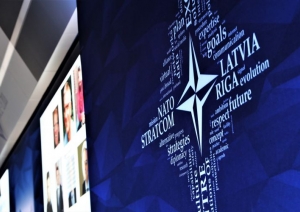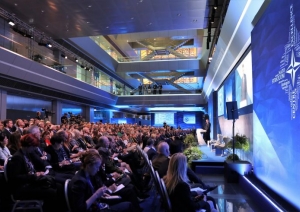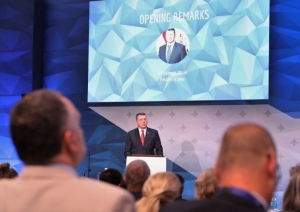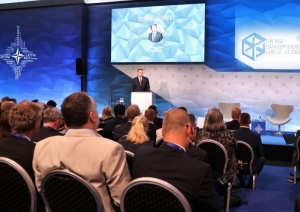We live in a complex world of many challenges. And they range from avoiding nuclear war through terrorism and migration to global warming, ageing and environmental protection.
These challenges have deep roots and there will be no quick and easy solutions. Therefore we should identify and address the causes rather than just react to the symptoms. We need to understand better what is going on, and in particular, why it is happening.
Technology is progressing on this in lightning speed. And there is a tendency to focus here on the search for solutions. I believe that this is fundamentally the wrong course of action. We must put people ahead of technology.
Of course, we need to understand how technology is changing our world, the daily lives of our people, and the ways we communicate. We must seize the opportunities this offers. But then, we must also recognise what risks may arise.
In the last couple of years, we have done much to strengthen our hard security. NATO’s eFP is an important step in securing our defence.
While this is essential for our safety, we must also take the next step. That is to strengthen our soft security capabilities. The battle for the hearts and minds of our populations is increasingly taking place in the moral and cognitive domains.
Our Western values are under threat from rivals targeting our social cohesion, shared norms, and economic and institutional structures. Public trust in the democratic election process is under attack. These are challenges to the very foundations of our democracies. To defend ourselves we must communicate about, with, and between people. We must understand their needs, motivations and thinking.
Far-sighted strategic communication is a central part of this work. It offers us a tool for dialogue, for interpreting problems and their root causes. It allows us to frame solutions towards our intended goals. Strategic communication is about creating changes and being the architects of our own future – rather than merely reacting to events. That is why it is called “strategic”.
This will only work if communication is at the foundation of our public service. This requires professional training based on science and research. It also requires an awareness and basic media literacy on the part of the public. This has to be formed through the development of critical thinking – an essential for success in the modern world.
To end, I would like to remind us all that strategic communication is only the third step on our path. It will only be successful if it is based on strategic thinking followed by strategic planning. And, of course, after communication comes strategic implementation – essential if we want to reach our aims. That means, sticking to the chosen course – the strategy.
I am glad to see that since the STRATCOM Centre of Excellence was established in 2014, strategic communication has increasingly been a part of decision-making in many countries, including Latvia. The importance of the Centre has been properly recognised.
I wish you all a creative and fruitful conference!








